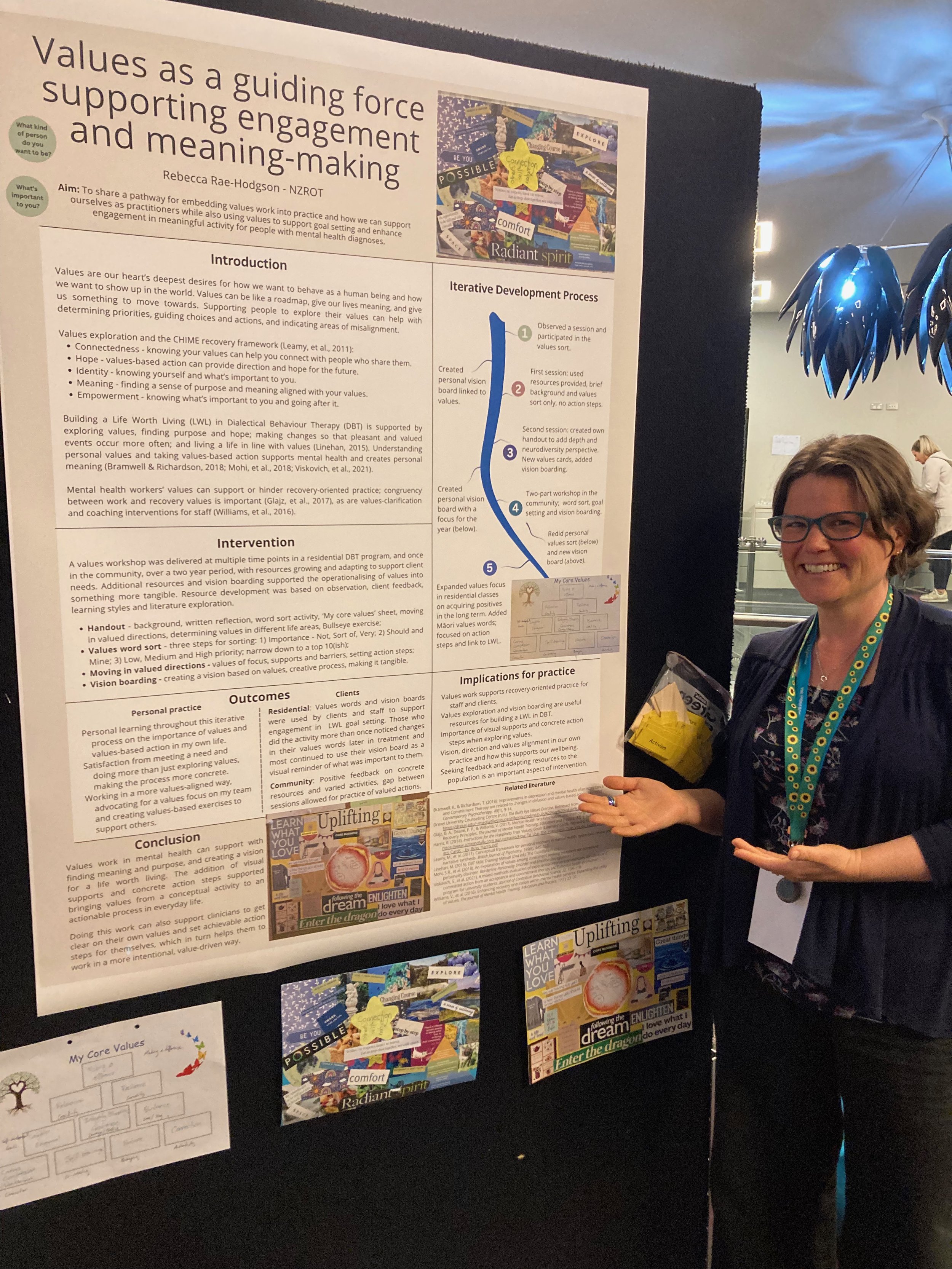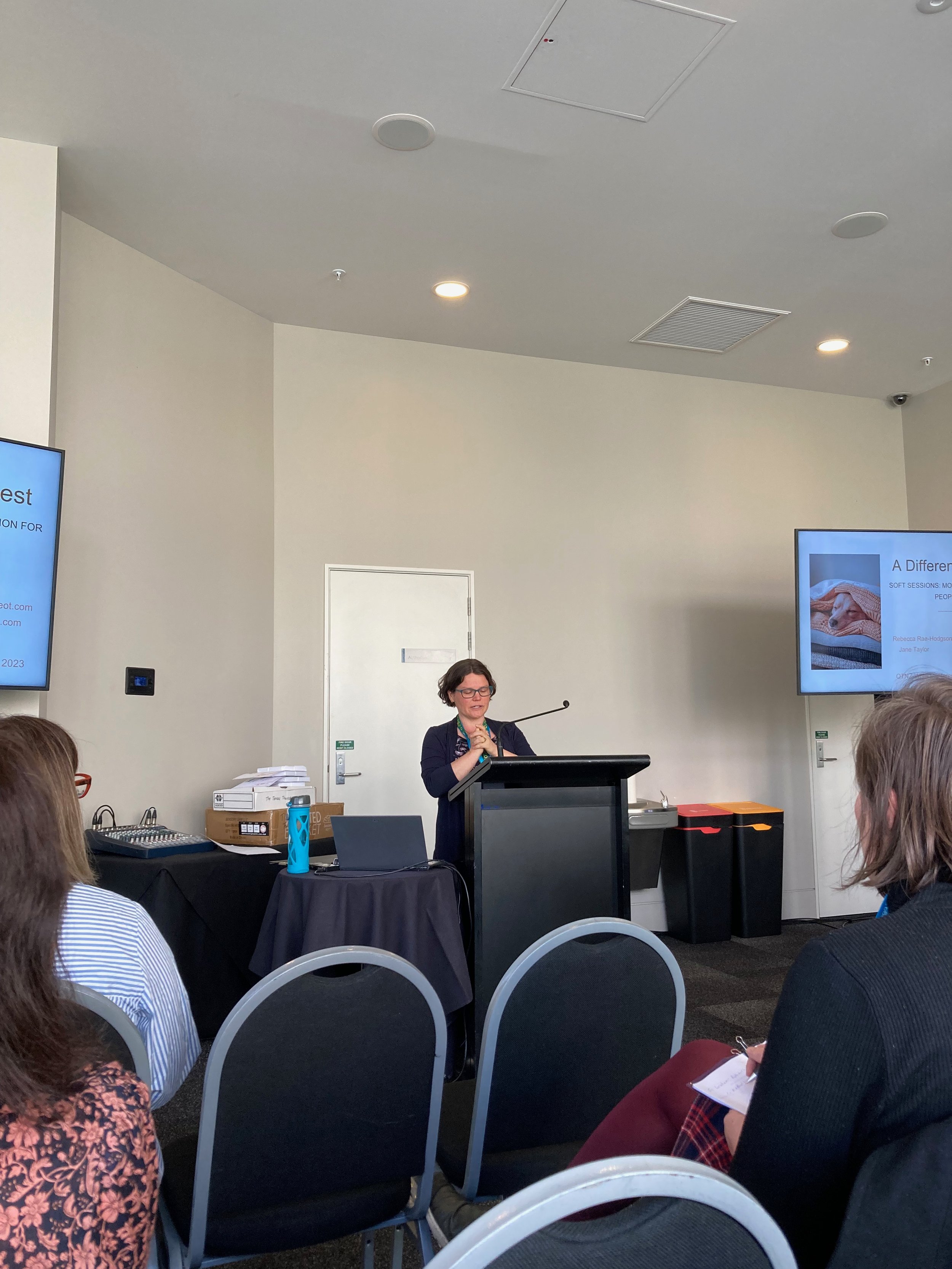OTNZ-WNA Conference 2023
The Occupational Therapy New Zealand-Whakaora Ngangahau Association (OTNZ-WNA) held their conference in Dunedin in September this year and I decided to go. This was my first time presenting at a conference. I was nervous and apprehensive going into it, doing something new and putting myself out there is challenging. On the whole I really loved it! I enjoyed connecting with other occupational therapists, listening to what they’re passionate about, sharing my projects and learning new things. Working rurally and in isolation like I do, it was really nice to be in a space with lots of other people who think in a similar way and who are also passionate about occupational therapy.
Managing the conference
I combined the trip to Dunedin with a trip to Christchurch for my last study block for a postgraduate certificate in mental health and addictions, so was away from home for 2 weeks all up with a lot of driving to do to travel around the south island. So how did I manage it?
Driving - always lots of podcasts and snacks. I stop when I need to and keep my brain engaged by listening to comedic or educational podcasts. I’ve also started keeping a fidget cube in the car to use when I need to. This time I broke up the driving by staying with friends at different spots as Dunedin is a long way away from where I live!
Accommodation - I was able to stay with a friend, in a quiet suburb where I had my own space and plenty of room for food prep and storage.
Food - bulk cooking, preparing ahead. The day before the conference I prepared lunches, snacks and dinners so that I wouldn’t have to cook at all during the conference days. Packed a lunch bag for the conference days.
Accommodations for myself - Loop earplugs, comfortable clothes and shoes, fidget necklace and other fidgets. Familiar foods. Taking breaks, standing during talks or sitting on the floor as needed. Clipboard and paper for notes to help keep focused. Planned ahead for which talks I wanted to go to and looked at the venue map so I knew where I needed to be. Parked close to the venue and drove in so I could leave if needed.
Social interactions - talking about what I love is a very different kind of social interaction to making small talk. I felt energised when talking to people about my poster and when finding fellow neurodivergent occupational therapists or ones with similar interests. I went to the evening social event for 2 hours only. For the first part I sat and read a book to settle into the space. It helped that it was at the museum and they had the science centre open and we got to go in and see the butterflies, which created some activities to focus on.
Poster - Values as a guiding force supporting engagement and meaning-making
This was my first ever try at a poster and I was really happy with the result. I used Canva for creating it and had some really helpful feedback from a friend about the design and making sure the content was clear.
The instructions for the conference said to spend time near my poster in the breaks and so that’s what I did and I had lots of interesting conversations about the process. This was a reflection on a personal project I’ve been working on over a two-year period, developing a values workshop and how I have used this practice with myself and with clients.
The next step is to adapt the content to an online format that I can deliver to other health professionals and share out the resources.
—
Image description: a picture of a short haired person wearing glasses and a sunflower lanyard smiling at the camera and gesturing to a conference poster. The poster is titled ‘Values as a guiding force supporting engagement and meaning-making. It outlines a creative iterative process of the development of a values workshop. The importance of exploring values, what the intervention is, what the outcomes were for clients and for personal practice, the implications for practice and a conclusions.
Pictures on the poster are of two vision boards and a values pyramid. The physical copies of these are also pinned below the poster. The vision boards and values pyramid represent the authors personal experience of the values exploration process and making a visual. Also hanging up is a zip loc bag with a set of values words printed on yellow card.
Oral presentation - A Different Kind Of Rest
Introducing Soft Sessions
A friend of mine has been working on a project developing a movement and mediation program for people with ME/CFS for a number of years. I came on board to support a couple of years ago and suggested we take what we have to the conference. She agreed and we worked hard together to create the presentation.
Explaining the background, our aims and what we have been doing in only 12 minutes was tricky but we managed it.
It was really useful working on this presentation with someone else as we could bounce ideas off each other and it wasn’t done as last minute as some other projects either! I also made the effort to actually practice the presentation to check timing and flow. I was nervous up there but also excited to share the project as it is one I care a lot about.
You can find more about this project here Soft Sessions . We are hoping for the program to be live later this year.
—
Image description: a photo of a short person with brown hair, wearing glasses and a blue shirt, standing behind a lectern with their hands clasped, in the middle of a presentation. To either side are the edges of two screens with the presentation on. In the foreground are some chairs and the backs of a couple of people’s heads.
Session Reflections
Threshold Concepts in Occupational Therapy - Helen Jeffrey and Jackie Herkt
Interesting workshop on exploring our threshold concepts in practice, our aha moments and worldview shifts
Practical activity brainstorming on butcher’s paper, writing down examples, thinking about what makes us occupational therapists, things embedded in who we are and how we practice, things specific to occupational therapy
Thought provoking exercise to reflect on these things, getting clearer on what I see differently and who I am as an occupational therapist and some of the moments and aspects that have shaped my practice.
What is occupational therapy again?
Workshop on exploring the business case for occupational therapy, what we can do to increase role clarity, consistency, visibility and credibility
It was so interesting to hear other people’s ideas and add my own and to be in a room full of so much passion for the profession and what we can do
Pain Mechanisms and Context-Sensitive Pain Management - Bronwyn Lennox Thompson
Hugely informative presentation from Bronwyn, who does some amazing work in the pain space, too many notes to share here!
Key takeaway for me was how important it is to still do things even with pain (in the way that we can); pain always has meaning, how we think about pain is important (and this doesn’t mean it’s all in our heads); pain is complex and doesn’t correlate highly with disability or physical impairment, other factors are involved; nociceptive processing and nociplastic changes in the brain with chronic pain; different types of pain and different networks; how occupational therapists can support people by reflecting on their own practice and upskilling; ICD-11 guidelines.
The Waka Framework - Janie De Malmanche
Reflective and creative tool to explore where people are stuck and what might be getting in the way using a waka metaphor to describe a life journey
Interesting workshop on a useful tool, similar concepts to the Kawa Model; drew out my own like a pathway with different options and barriers, was helpful with representing where I want to go in the future
ACC ISSC evolution
Presentation from ACC on the direction the sensitive claims contracts are moving in based on feedback and a big project exploring what needs to change and how; really great to see a move towards more client choice and a larger range of health professionals being funded, definitely a step in the right direction - relevant to my employed role.
The Ethical and Moral Imperatives of Collaborative Relationship-Focused Occupational Therapy - Gayle Restall
Really interesting keynote exploring moving beyond client-centred practice to collaborative relationship-focused practice where the relationship is at the centre; important to unpack how therapy principles come through our own biases and lenses, considering our own identities and contexts, acknowledging colonialism, racism and priviledge in our profession; need to address inequities in access to education and consider multilevel contexts; work actively to dismantle oppressive systems and structures with critical reflexivity, critical reflection and moral courage
Life Begins At The Edge of Your Comfort Zone - Fi Graham
Fi discussed leaning into the uncomfortable, working on the edge of your comfort zone and not always knowing what’s coming next; she shared her experience developing Occupational Performance Coaching focusing on the desired outcome not just the current problem; coming back to occupation as a touchstone and what gives a person’s life meaning, understanding people as occupational beings
This was the opening keynote and was so inspiring as someone who is doing things a bit differently and exploring how I want to practice as an occupational therapist. So much of what she spoke about resonated strongly with a meaning and occupation focus and looking at where we’re going. I have admired her work for a while and want to explore it some more.
Pain management - Diane Henery
The Magazine Picture Collage tool - clients are given 30 minutes and a range of resources to explore the meaning of their pain and represent it visually, which then opens up a discussion on the meaning of what they put down and draws out different words and experiences; can use as an outcome measure to see changes
Love the idea of this tool and having people represent their pain, it was also great to again have affirmed the importance of doing and wellbeing from enagement.
A Whole of System Approach to Cultural Safety - Kiri Rikihana
Moving beyond cultural awareness or cultural competency to cultural safety, anti-racism, equity, how we can open and close doors for people, being aware of our own power and privilege, focus on client experience and quality of care; self-reflective practice is ongoing, how to create cultural safety, reflect-review-change-practice-share-monitor
Interesting to hear it spoken about like a continuum from cultural awareness to cultural competency to cultural safety; really important points on how we need to do better and how we can reflect and change our practices and the importance of client feedback.
Activating Practice for the Journey Ahead - Dr Mary Silcock
Pae Ora Act and journeying together, sharing power through collaboration, changing our practice, contest dominant norms, informal networks and collective local solutions; New Zealand Health Strategy 2023
Interesting look at how what we’re doing links to policy and how we can create change, more reading to do in this area.
Summary
I was pleasantly surprised by how much I enjoyed the conference. It has reignited my passion and confirmed my ideas around how I want to work as an occupational therapist.
I hope to do more speaking and conferences in the future and am considering future studies as well.
I will continue to explore and connect and work towards living more in line with my values in a way that supports my own needs and capacity, while also improving community connections and working for bigger system change from my little corner of the world.
—
Image description: a phot of a black and red butterfly sitting on a person’s hand with greenery and a pond in the background.


